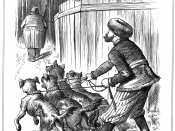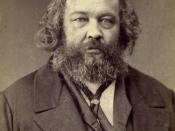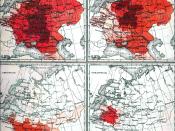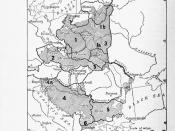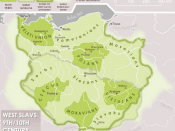In the words of Karel Havlicek, "Nationality is not only determined by language, but also by customs, religion, form of government, state of education, sympathies"æ" A nationality cannot exist without a nation, language, culture, homeland, and an identity that other nationalities recognize. The Slavic people didn't share any one of these cultural attributes throughout their population. Therefore I believe the Slavs are not a true nationality, and as a result, Pan-Slavism was a pointless movement. The fact was that the Slavs were spread throughout Europe. Thus without a single nation, and only a senseless bunch of ideas to join them together, it was not surprising that they had no support from the rest of Europe. Pan-Slavism was doomed to failure.
The Slavic people were citizens of Austro-Hungary, the German Empire, the Ottoman Empire, Russia, and other countries throughout Europe in great numbers. Some could see this as a people who were torn apart and spread throughout Europe, but in truth this happened to many besides the Slavs.
Yet the Slavic people didn't end up in some gray area of nationality. The naming of these Russians, Austrians, Hungarians, Germans, Poles, Czechs, etc., as Slavs was a great mistake however. They could not be united as a people and be given a nation-state. Many of these Slavs who resided in the countries would call themselves Russians or Austrians because those were the residential nations. However the ridiculous Pan-Slavism movement named people in many different countries by one name and told them to unite. What was this based on though? They did not share a common religion, language, government, or customs. The "Slavs already have unity as Russians, Poles, Hungarians, or whatever respective country they belong to and to take half the people of Austro-Hungary, half the people of the Balkan area of the Ottoman Empire, and a quarter of the people of the Russian Empire and to tell them to unite as one nationality is ludicrous.
How can one call the Slavs a nationality when they don't have a nation or a documented homeland? Yet, Pan-Slavism did just this, and the leaders of the movement told them to unite and challenge other countries to give up their land and people to the Pan-slavs. The leaders disregarded the stronghold existence of the existing cultures, some of who had dwelled in their countries for generations. The fact was they could not succeed. Pan-Slavism was the brainchild of a desperate group of people in Europe. Ideas such as those reflected the unhappiness of the people who were lost at a time of great economic growth and development. People becoming unhappy and demoralized was to be expected when the tidal wave that was the industrial revolution swept across Europe, and pulled many under its riptide of poverty and exploitation. So with an ill-conceived movement and no nation, Slavic unity was but a product of an over-idealistic people.
Some might say that the Russians were supporting Pan-Slavism selflessly but those people would be naÃÂïve. No one with the power to give the Slavs what they asked for truly recognized the Slavs as a nationality who deserved to be given vast lands for the settlement of the millions of Slavs spread throughout Europe. Pan-Slavism sought support from the Russian Tsar to provide them with a Slavic state. The Russians took a benevolent standpoint with malevolent undertones. The nation was to be where the Austrian Empire currently was and with Austria gone, Russia could move into that territory and acquire what they needed for complete dominance of Europe. Only the most idealistic of the already extremely idealistic Pan-Slav supporters truly believed in Russia to provide them with a nation. Russia was also the Slavs best shot at Slavic unity, which showed the support they received from other countries. No one recognized them as a nationality or took them seriously as a movement. No one at an influential position was going to bother supporting their cause. Obviously nineteenth century Pan-Slavism was merely a social fad, which was made more popular by the Russians' exploitation.
The facts and historical sources show that Pan-Slavism was a weak movement with meager hopes for success. The reason that the movement existed over time was that it was manipulated and exploited by those in power, mainly the Russians, in order to gain more power. At the core of this movement are the scattered and dissimilar Slavs who have none of the characteristics of a nationality and aren't ready to be united and independent. However Pan-Slavism continued to grow because of the over zealous creators of the idea and the confidence they were able to imbue on an unsatisfied group of people. Therefore, realistically Pan-Slavism was doomed to fail for all of the aforementioned reasons.
